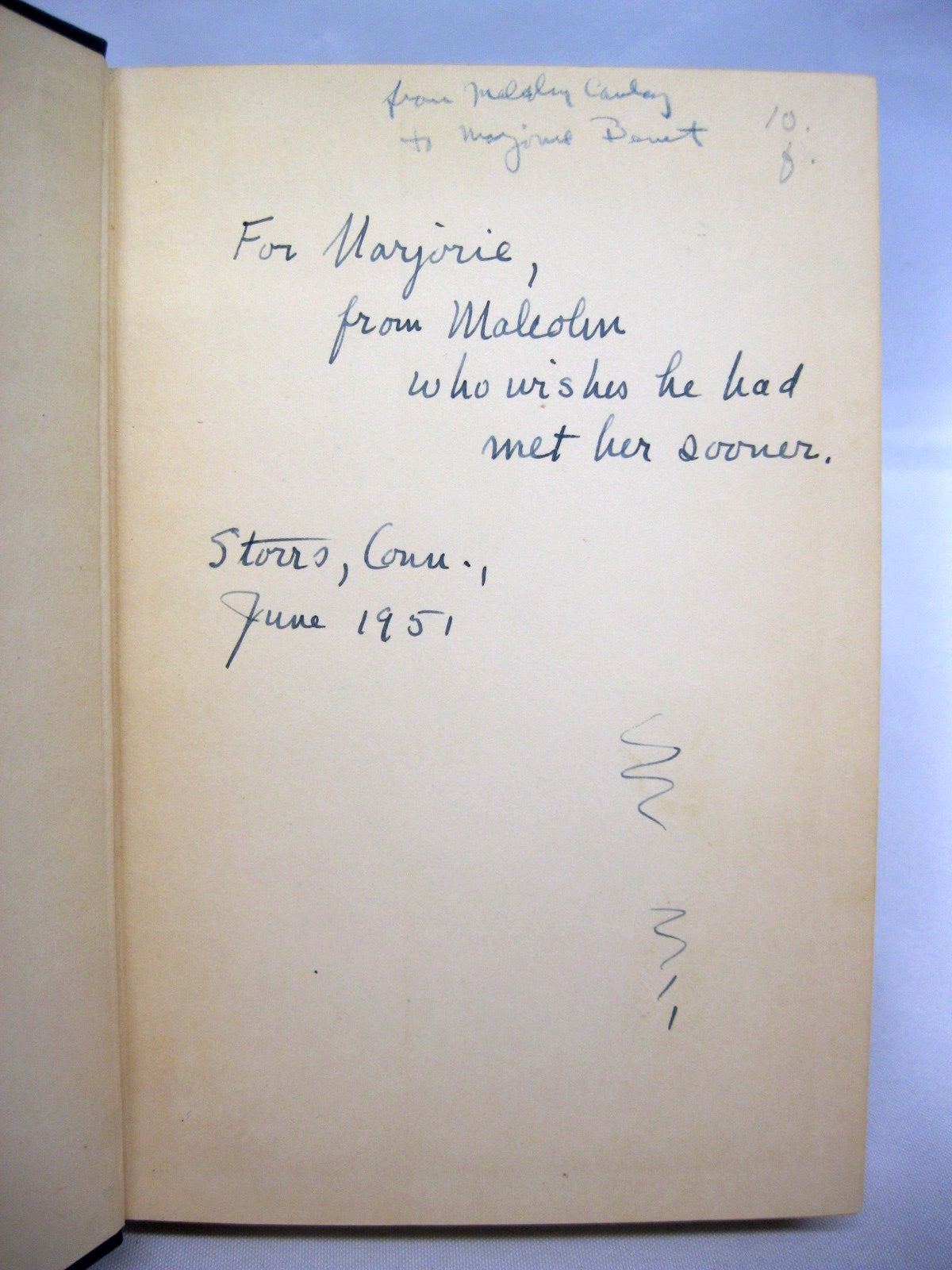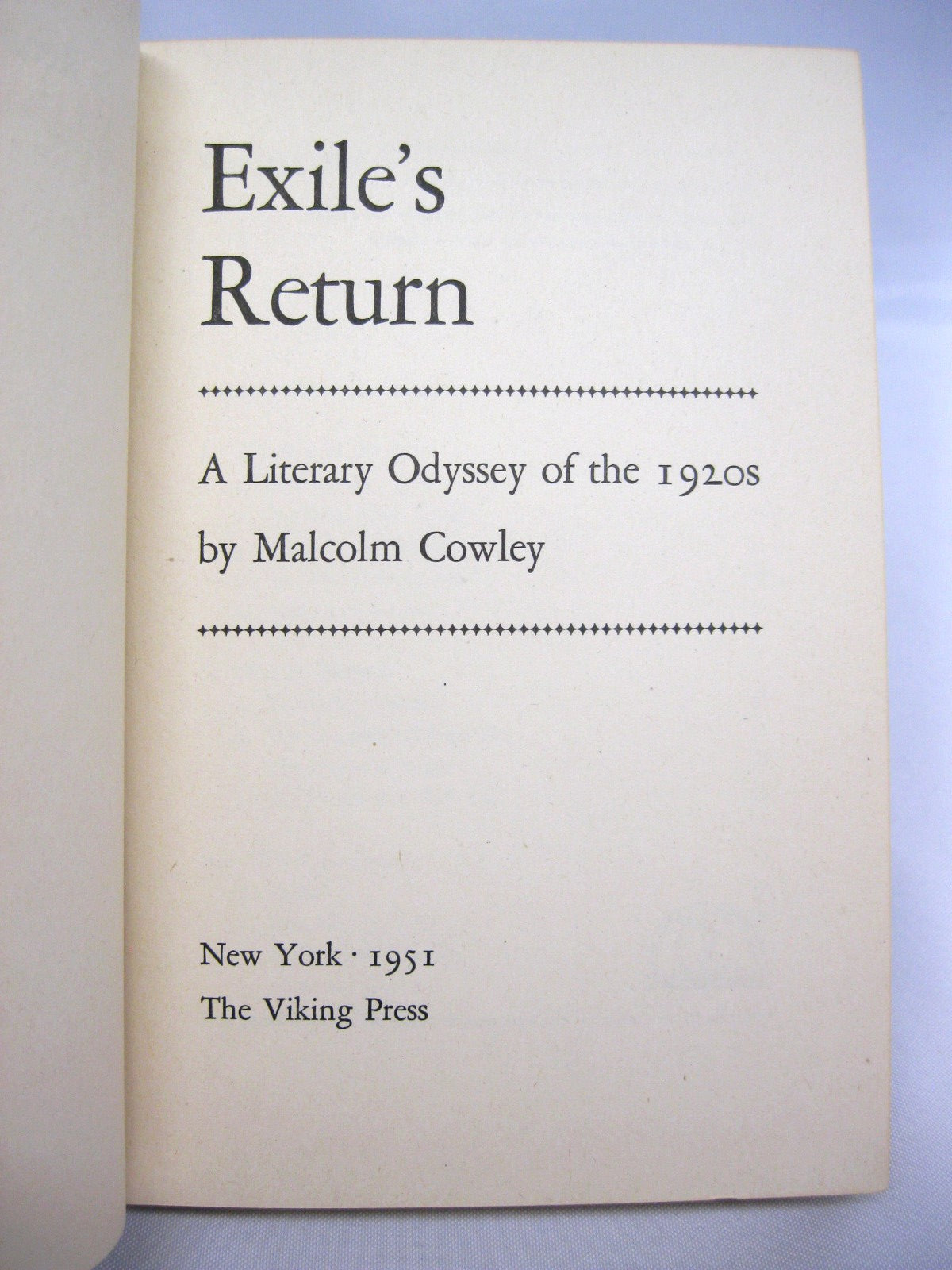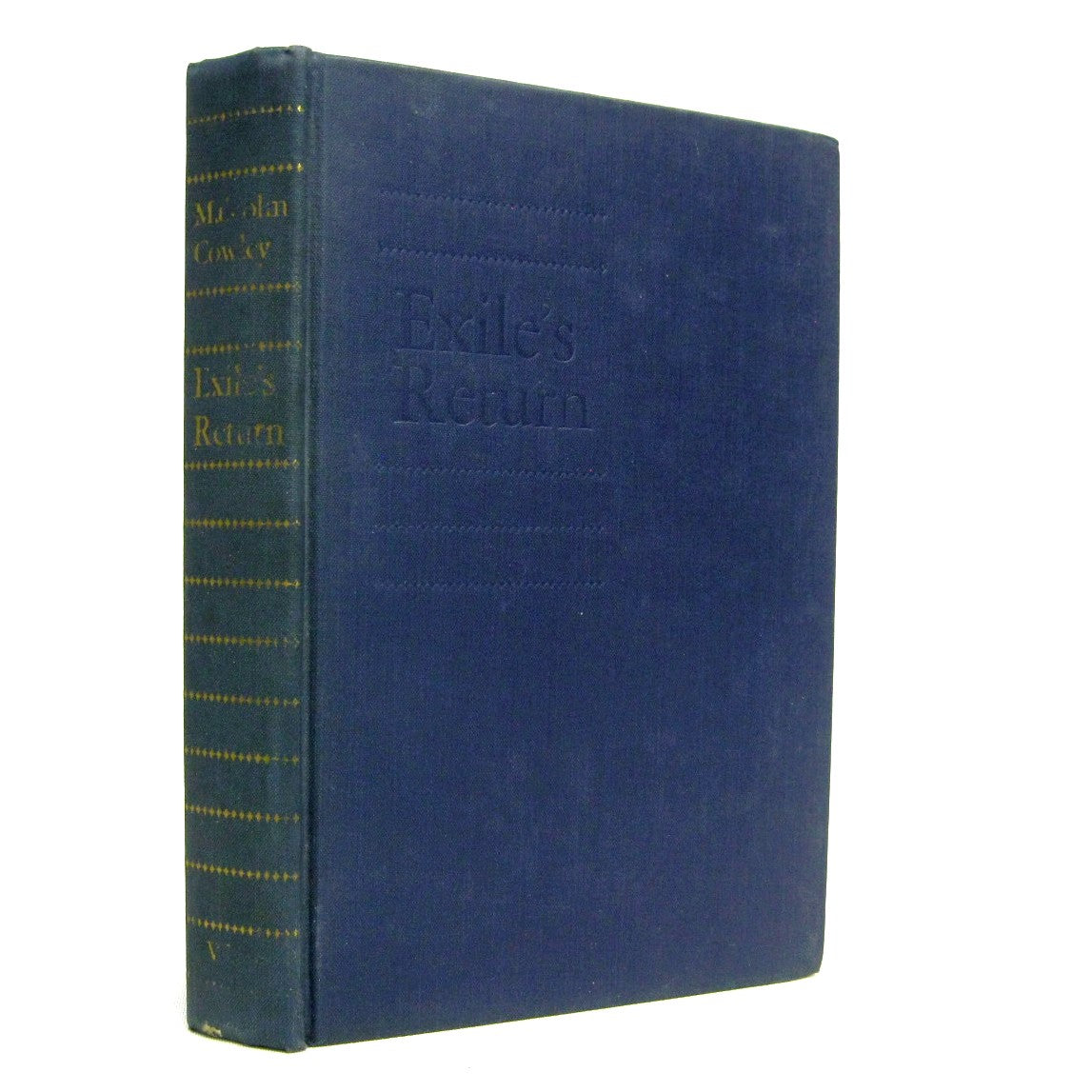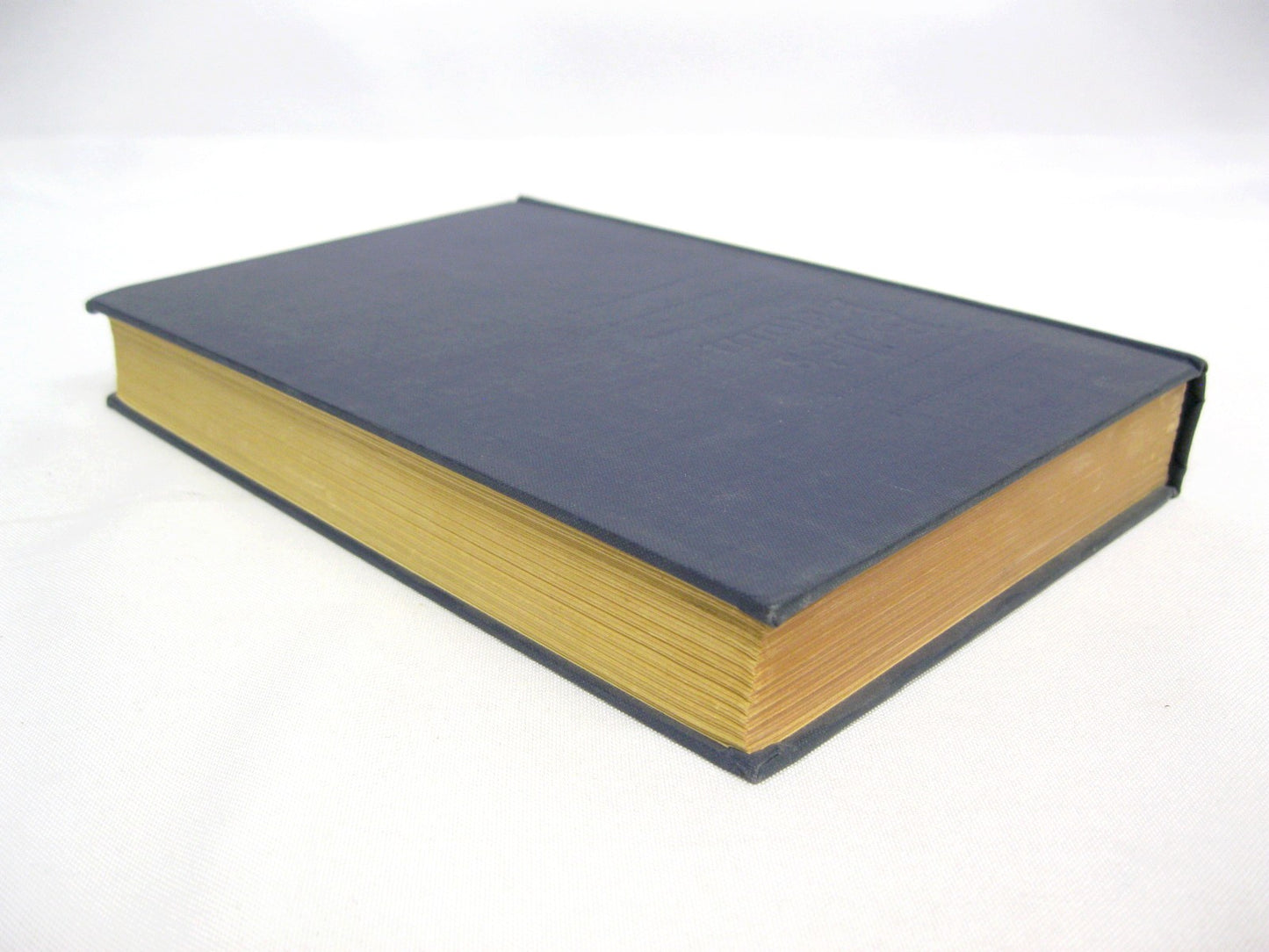Exile's Return by Malcolm Cowley
Exile's Return by Malcolm Cowley
Regular price
$69.98 USD
Regular price
Sale price
$69.98 USD
Unit price
per
Couldn't load pickup availability
Exile's Return: a Literary Odyssey of the 1920s
by Malcolm Cowley
New York: The Viking Press
Revised edition June 1951, originally published 1934.
SIGNED and inscribed by Cowley on the ffep: "For Marjorie, from Malcolm, who wishes he had met her sooner. Storrs, Conn. June 1951". There is a note in blue pencil above it stating "from Malcolm Cowley to Marjorie Benet". There was a Marjorie Bennett who was an Australian actress working in the UK and US who was his contemporary, but further clues elude me.
Condition: Hardcover; no dust jacket. Cover boards have light general wear, spine faded. The interior is clean and neat, and the binding remains firm.
wiki: "Malcolm Cowley (August 24, 1898 – March 27, 1989) was an American writer, editor, historian, poet, and literary critic. His best known works include his first book of poetry, Blue Juniata (1929), his lyrical memoir, Exile's Return (1934; rev. 1951), as a chronicler and fellow traveller of the Lost Generation, and as an influential editor and talent scout at Viking Press.
Cowley was one of the many literary and artistic figures who migrated to Paris in the 1920s. He became one of the best-known chroniclers of the American expatriates in Europe, as he frequently spent time with writers like Ernest Hemingway, F. Scott Fitzgerald, John Dos Passos, Ezra Pound, Gertrude Stein, E. E. Cummings, Edmund Wilson, Erskine Caldwell, and others associated with American literary modernism. In Blue Juniata, Cowley described these Americans who travelled abroad during the postwar period as a "wandering, landless, uprooted generation"; similarly Hemingway, claiming to have taken the phrase from Gertrude Stein, called them the "lost generation". This sense of uprootedness deeply affected Cowley's appreciation for the necessities of artistic freedom. It moreover informed his ideal of cosmopolitanism in contrast to the fervent nationalism(s) that had led to World War I. Cowley recounted his experiences in Exile's Return, writing, "our whole training was involuntarily directed toward destroying whatever roots we had in the soil, toward eradicating our local and regional peculiarities, toward making us homeless citizens of the world".
Literary historian Van Wyck Brooks described Exile's Return as "an irreplaceable literary record of the most dramatic period in American literary history."
Cowley then published a revised edition of Exile's Return in 1951. The revisions downplayed some of the more overtly Marxist tenets, and more obviously emphasized the return of the exile as a necessary step toward reestablishing a nation's solidarity: "the old pattern of alienation and reintegration, or departure and return, that is repeated in scores of European myths and continually re-embodied in life", Cowley wrote."
by Malcolm Cowley
New York: The Viking Press
Revised edition June 1951, originally published 1934.
SIGNED and inscribed by Cowley on the ffep: "For Marjorie, from Malcolm, who wishes he had met her sooner. Storrs, Conn. June 1951". There is a note in blue pencil above it stating "from Malcolm Cowley to Marjorie Benet". There was a Marjorie Bennett who was an Australian actress working in the UK and US who was his contemporary, but further clues elude me.
Condition: Hardcover; no dust jacket. Cover boards have light general wear, spine faded. The interior is clean and neat, and the binding remains firm.
wiki: "Malcolm Cowley (August 24, 1898 – March 27, 1989) was an American writer, editor, historian, poet, and literary critic. His best known works include his first book of poetry, Blue Juniata (1929), his lyrical memoir, Exile's Return (1934; rev. 1951), as a chronicler and fellow traveller of the Lost Generation, and as an influential editor and talent scout at Viking Press.
Cowley was one of the many literary and artistic figures who migrated to Paris in the 1920s. He became one of the best-known chroniclers of the American expatriates in Europe, as he frequently spent time with writers like Ernest Hemingway, F. Scott Fitzgerald, John Dos Passos, Ezra Pound, Gertrude Stein, E. E. Cummings, Edmund Wilson, Erskine Caldwell, and others associated with American literary modernism. In Blue Juniata, Cowley described these Americans who travelled abroad during the postwar period as a "wandering, landless, uprooted generation"; similarly Hemingway, claiming to have taken the phrase from Gertrude Stein, called them the "lost generation". This sense of uprootedness deeply affected Cowley's appreciation for the necessities of artistic freedom. It moreover informed his ideal of cosmopolitanism in contrast to the fervent nationalism(s) that had led to World War I. Cowley recounted his experiences in Exile's Return, writing, "our whole training was involuntarily directed toward destroying whatever roots we had in the soil, toward eradicating our local and regional peculiarities, toward making us homeless citizens of the world".
Literary historian Van Wyck Brooks described Exile's Return as "an irreplaceable literary record of the most dramatic period in American literary history."
Cowley then published a revised edition of Exile's Return in 1951. The revisions downplayed some of the more overtly Marxist tenets, and more obviously emphasized the return of the exile as a necessary step toward reestablishing a nation's solidarity: "the old pattern of alienation and reintegration, or departure and return, that is repeated in scores of European myths and continually re-embodied in life", Cowley wrote."
















